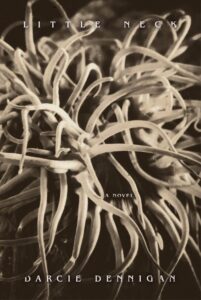This first appeared in Lit Hub’s Craft of Writing newsletter—sign up here.
Article continues after advertisement
I’m not sure how to survive without writing.
It is what I want to do with the time I am alive.
The idea of sacrificing for writing doesn’t make sense to me because writing is not an ideal, belief, or higher object, (we don’t have time here to suss out what the higher object is!), no, it’s an action and can occur almost anywhere. I remember way back around 2000 and something, the incantatory poet Kyle Dargan telling me how he mostly wrote on public transportation. Around that same time I remember reading Midwinter Day and thinking, “Is Bernadette Mayer telling me that she is writing a book whilst stoveside, stirring a pot of spaghetti?“
And having grown up with this lone picture in my head of a writer in a dark, cool den, a solemn writer at a formidable oak slab of a desk, the air around his head reeking of import and cigar smoke, I keenly collected these more… alive… spaces and interstices where writing happens. Because early on I understood that I wouldn’t be able to be doctrinaire. My routines get unrouted. And having made a study of writers I loved who did not have a set writing space, I certainly internalized it, for here is a non-exhaustive list of settings in which I worked on my novel Little Neck:
Kate S’s kitchen table one humid summer (that’s where I started it), my kitchen table, Kate C’s parents’ kitchen table, Julia’s kitchen counter (that’s where I finished it)
On my couch, in various chairs, and at my desk (I do have one)—the surfaces of each replete with cat hair
In a surprisingly commodious folding chair at a conference honoring the inventor of the loading coil for long-distance telephony
Cross-legged on a futon that functions as a bed while waiting at an apartment for erotic encounters
Parked in my car at umpteen places, or actively commuting with a notebook balanced on the emergency break
Atop the YMCA’s poolside bleachers
I even attempted some editing at Tate McRae’s 2024 Boston concert, where, because bags had to be checked, I trailed a bunch of preteens in the MGM Music Hall with my sheaf of papers and a leaky pen, feeling like the jerk I was
And yet, one can get precious about not being precious. What about the reverie that wild silence makes?
My first memory of that space, the outside of timeness, was, of course, reading—reading by myself, in the backseat of a sedan, windows up, with my mother and my grandmother standing in the parking lot waiting to go inside a store. It was a searingly hot day, my legs were stuck to the backseat vinyl, the shadeless parking lot was all concrete, or maybe tar, and I had a mother and a grandmother who must have had so much to do and were somehow patient enough to stand around in the sun while I read maybe twenty pages, because I had to finish that book, my first chapter book all to myself, The Secret Garden by Frances Hodgson Burnett.
One can get precious about not being precious. What about the reverie that wild silence makes?
In the past two decades, I’ve made predawn/dawn hours into the outside-of-time space. To preserve its silence I have gone to my own minor extreme: rather than risk using the bathroom and waking up my fellow inhabitants, I have tiptoed outside in the pre-5 AM dark, even winters, to pee on a strip of cement between houses, then back to the chair by the window, sometimes with a view of the moon setting, And your heart / rising to the silence / in all of them, a silence / so complete that / the heads of the corn / bow back before it. (That’s Brigit Pegeen Kelly.) But around the time I started writing Little Neck, I also started to have these extra pockets of time in which I could write, and I wanted to write somewhere beautiful. A meadow, or a prairie, which takes, in the famous recipe, One clover, and a bee. /And revery. / but /The revery alone will do, /If bees are few.
I ended up writing most of the first two drafts of the novel in the grassy expanses of three Rhode Island cemeteries:
Oakland Cemetery
One of the most feral cemeteries I have found—its owners died, and for a while the grass and weeds were overtaking the stones—even very recent ones dated 2007, or 2009.
Living mourners brought flowers and matchbox cars and teddy bears and photos, and they cleared their dead’s graves but it was a battle against autumn leaves and general entropy. The mausoleum here is crumbling, and while I never forced my way inside, I heard stories of the bones strewn across its floor. In this cemetery it is easy to understand on a bodily level how graveside flowers sprout from corpses. It’s true that many grieve the unkempt grounds and the desecration of the mausoleum, but I love the tall grasses and weeds, I love the grave offerings, the crumble all about is beautiful and I would prefer it for myself.
St. Mary’s Cemetery
This one is on a hill overlooking an old mill city. My paternal grandmother’s ashes are illegally scattered here, and my maternal grandparents are buried here, but I was too
close to them when they were alive to be able to write now near their grave. Instead I go to the older section of the cemetery, where my baby cousin is buried near my great grandmother, Marguerite—I can tell when one of my uncles had been visiting, because the lichen and mildew will have been newly scraped off both of their stones. I try to plant perennials at the sunnier graves (coneflower, black-eyed susan, lupine, blue aster…), a mini prairie of wildflowers, it always gets weedwhacked.
Riverside Cemetery
This one is often locked and the gates are high, but if you go a little bit off the road, there’s a place where you can climb over and that gives the whole thing a secret garden aura. There is a broken road running through the center, flanked by a tunnel of old pines. I have a favorite tree stump for sitting, the river is invisible until you get to the bottom of the hill, and there are often rumors of owls and other exciting birds, but I love just looking down, at the grass and all the bugs, there are a lot of pill bugs here! I love the fake flowers and the real ones, but the weeds best of all. Sometimes violets come up, unbidden. It’s a good place to write, I like the company.
When I write, I long to enter—no—to visit—a particular state. It’s one I have felt inside a few books too—like Brandon Shimoda’s Evening Oracle and Thoreau’s notebook Wild Fruits. But I always feel it in cemeteries. I want to write until I feel mortal and decompose myself and become a flower.
____________________________________
Little Neck by Darcie Dennigan is available via Fonograf Editions.

